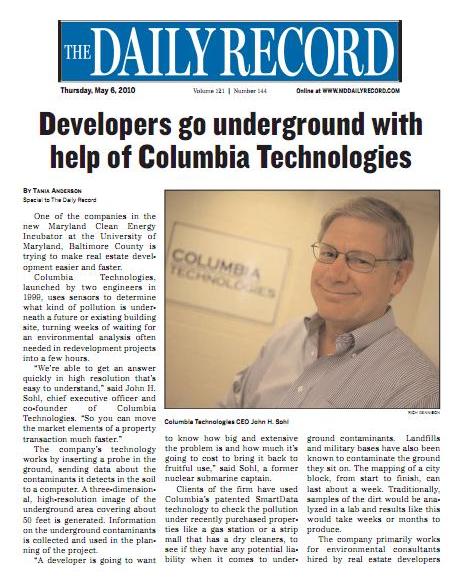Article originally featured in The Daily Record May 6, 2010 Issue
One of the companies in the new Maryland Clean Energy Incubator at the University of Maryland, Baltimore County is trying to make real estate development easier and faster.
Columbia Technologies, launched by two engineers in 1999, uses sensors to determine what kind of pollution is underneath a future or existing building site, turning weeks of waiting for an environmental analysis often needed in redevelopment projects into a few hours.
"We're able to get an answer quickly in high resolution that's easy to understand," said John H. Sohl, chief executive officer and co-founder of Columbia Technologies. "So you can move the market elements of a property transaction much faster."
The company's technology works by inserting a probe in the ground, sending data about the contaminants it detects in the soil to a computer. A three-dimensional, high-resolution image of the underground area covering about 50 feet is generated. Information on the underground contaminants is collected and used in the planning of the project.
"A developer is going to want to know how big and extensive the problem is and how much it's going to cost to bring it back to fruitful use," said Sohl, a former nuclear submarine captain.
Clients of the firm have used Columbia's patented SmartData technology to check the pollution under recently purchased properties like a gas station or a strip mall that has a dry cleaners, to see if they have any potential liability when it comes to underground contaminants. Landfills and military bases have also been known to contaminate the ground they sit on. The mapping of a city block, from start to finish, can last about a week. Traditionally, samples of the dirt would be analyzed in a lab and results like this would take weeks or months to product.
The company primarily works for environmental consultants hired by real estate developers and property owners. They may get hired to study a piece of property in an urban area that is in the pipeline to get redeveloped. For example, Columbia works on the redevelopment of the former Montgomery Ward building in downtown Baltimore.
Columbia has also analyzed brownfields redevelopments projects with known contaminants from former industrial inhabitants, such as sites located along the Baltimore Harbor waterfront. The results may allow a developer to apply for grants and other types of funding to clean up the pollution.
"So they can manage the liability if they decide to retain it and lease it," Sohl said. "They don't want any issues to boomerang on them in the deal."
Columbia, which says it's profitable but declines to disclose revenue numbers, charges an average of $20,000 for the service. Their clients not only include environmental consultants working for real estate developers and property owners but also government agencies and large companies like Dupont and Honeywell. The company has been working on projects all over the country, as well as in Italy, Japan and New Zealand.
Locally, Columbia was hired by ARM Group Inc., an earth sciences and engineering firm in Columbia, to test the groundwater near a shopping center that previously housed a dry cleaners. the industry is notorious for industrial leaks of solvents into the surrounding area. ARM Group needed an assessment of how much needed to be cleaned up and how they were going to do it. The test results were available faster and cheaper than a traditional lab that would have charged extra for a 24-hour turnaround.
"There's definitely a benefit of the technology in that you can make real-time decisions," said Eric Magdar, senior project geologist for ARM Group. "We chose [Columbia] because of their history with the technology."
Columbia is now looking to develop sensors that can detect different chemical compounds such as pesticides and those found in agricultural run-off, as well as contaminants from pharmaceutical production.
"We have seen a constant growth in the idea of getting information sooner, easier, with a higher resolution, a lower cost and essentially speeding up the real estate transaction process," Sohl said.
Read the full article from The Daily Record.


